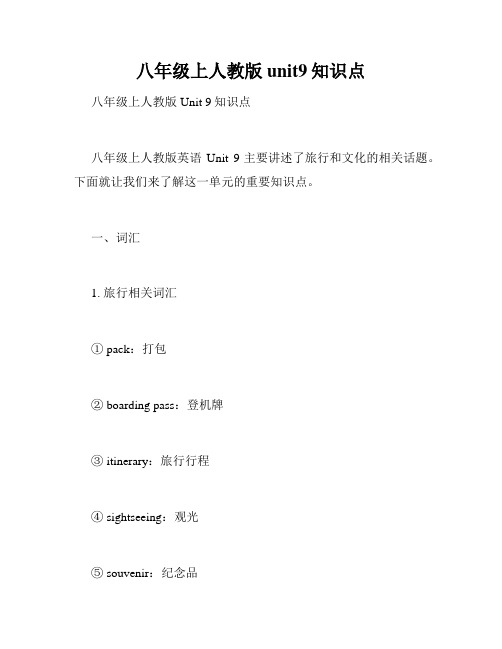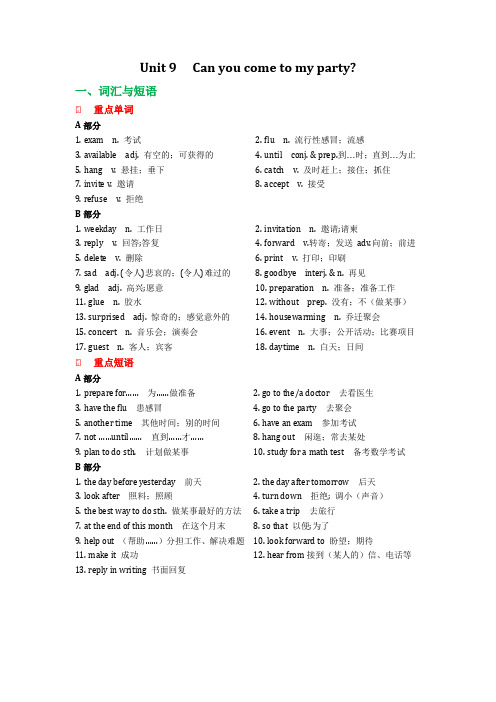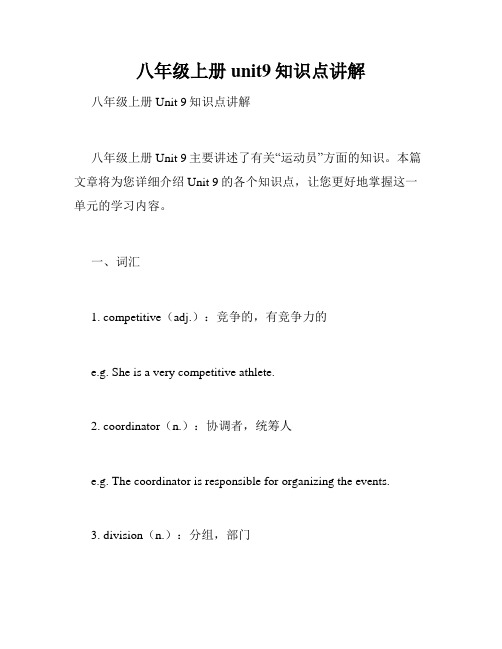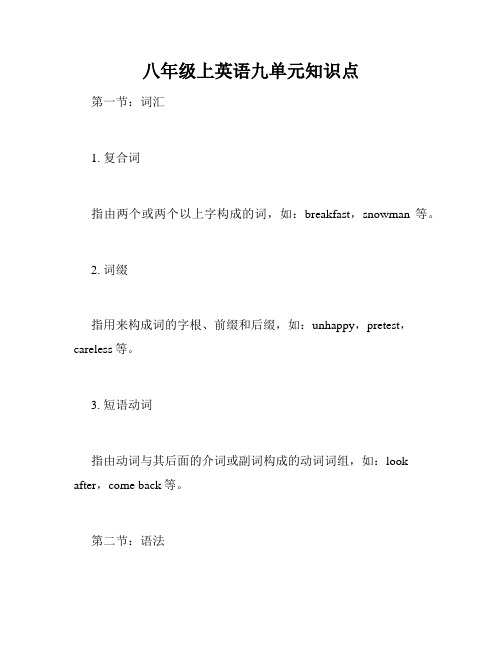(完整版)初二英语上册unit9知识点总结
八年级上册unit9知识点

八年级上册unit9知识点八年级上册unit9是英语中比较重要的一个单元,对学生综合语言表达及其应用能力的提高有着重要的作用。
在这个单元中,学生会学到很多关于旅游方面的英语表达,同时也会学到很多探讨自然灾害的话题,本文将为大家介绍unit9中的知识点,帮助学生更好地掌握这一单元的内容。
一、关于旅游方面的英语表达1. 旅行计划在旅行前,我们需要制定旅行计划,这里是几个可以帮助我们制定旅行计划的英语表达。
a. plan a trip:制订旅行计划b. book a flight:预订飞行班次c. make hotel reservations:预订酒店房间d. rent a car:租一辆车e. buy travel insurance:购买旅游保险2. 旅行中的交流在旅行中,我们需要与人交流以获取更多信息或者寻求帮助,这里是几个有用的英语表达。
a. Could you tell me how to get to the museum?:您能告诉我如何到达博物馆吗?b. Can you give me a map of the city?:你能给我一份城市地图吗?c. Excuse me, where is the nearest restroom?:对不起,最近的洗手间在哪里?d. How much is the admission fee?:门票多少?e. Can you recommend a good restaurant?:你能推荐一家好的餐厅吗?3. 旅游中的食品和饮料旅游中尝试当地的食品和饮料是一种非常好的文化体验,这里是几个与食品和饮料有关的英语表达。
a. I'd like to order a local speciality dish.:我想尝尝当地特色菜。
b. Could you bring me the menu, please?:请把菜单给我。
c. How much is a bottle of water?:一瓶水多少钱?d. I'd like a cup of coffee, please:请给我一杯咖啡。
八年级上人教版unit9知识点

八年级上人教版unit9知识点八年级上人教版Unit 9知识点八年级上人教版英语Unit 9主要讲述了旅行和文化的相关话题。
下面就让我们来了解这一单元的重要知识点。
一、词汇1. 旅行相关词汇① pack:打包② boarding pass:登机牌③ itinerary:旅行行程④ sightseeing:观光⑤ souvenir:纪念品⑥ travel agency:旅行社⑦ tourist attraction:旅游胜地2. 语法1. 一般现在时旅行相关对话使用一般现在时,例如:① What do you usually pack when you travel?② What kind of souvenirs do you usually buy?2. 一般过去时旅行中出现的时间过去时使用一般过去时,包括:① went,took,saw,bought,visited等② What did you do last weekend?3. 现在进行时旅行计划中的动作通常使用现在进行时,例如:① I am packing my bags for the trip.② She is planning to visit Beijing next week.4. 现在完成时表示已经去过或者做过某事情,使用现在完成时,例如:① I have been to the Great Wall.② Have you ever tried the local food when you travel?5. 选择疑问句提出选择性质问题时使用选择疑问句,例如:① Do you prefer traveling alone or with a group?② Would you rather visit a big city or a small town?二、常用句型1. 问路句型Excuse me, how can I get to…?Can you tell me the way to…?Is it far from here to…?2. 寻找帮助句型Excuse me, could you help me?I wonder if you could tell me…Do you know where I can find…?3. 对话句型① What are you going to do this weekend?I am going to…/I am planning to…② Did you go anywhere special on your last vacation? Yes, I went to…/No, I didn't go anywhere special.三、文化知识在旅行中,我们还需要了解一些文化知识,这对于我们更好地了解当地的风俗习惯,与当地人交流有很大帮助。
最全面人教版八年级上册英语第九单元知识点归纳总结

Unit 9 Can you come to my party?一、词汇与短语● 重点单词A部分1.exam n. 考试2.flu n. 流行性感冒;流感3.available adj. 有空的;可获得的4.until conj. & prep.到…时;直到…为止5.hang v. 悬挂;垂下6.catch v. 及时赶上;接住;抓住7.invite v. 邀请8.accept v. 接受9.refuse v. 拒绝B部分1.weekday n. 工作日2.invitation n. 邀请;请柬3.reply v. 回答;答复4.forward v.转寄;发送adv.向前;前进5.delete v. 删除6.print v. 打印;印刷7.sad adj. (令人)悲哀的;(令人)难过的8.goodbye interj. & n. 再见9.glad adj. 高兴;愿意10.preparation n. 准备;准备工作11.glue n. 胶水12.without prep. 没有;不(做某事)13.surprised adj. 惊奇的;感觉意外的14.housewarming n. 乔迁聚会15.concert n. 音乐会;演奏会16.event n. 大事;公开活动;比赛项目17.guest n. 客人;宾客18.daytime n. 白天;日间● 重点短语A部分1.prepare for…… 为……做准备2.go to the/a doctor 去看医生3.have the flu 患感冒4.go to the party 去聚会5.another time 其他时间;别的时间6.have an exam 参加考试7.not ……until…… 直到……才……8.hang out 闲逛;常去某处9.plan to do sth. 计划做某事10.study for a math test 备考数学考试B部分1.the day before yesterday 前天2.the day after tomorrow 后天3.look after 照料;照顾4.turn down 拒绝; 调小(声音)5.the best way to do sth. 做某事最好的方法6.take a trip 去旅行7.at the end of this month 在这个月末8.so that 以便;为了9.help out (帮助……)分担工作、解决难题10.look forward to 盼望;期待11.make it 成功12.hear from接到(某人的)信、电话等13.reply in writing 书面回复● 重点句子A部分1.--Can you come to my party on Saturday? --Sure, I'd love to.--周六你能来参加我的聚会吗?--当然,我想来。
八年级上册unit9知识点讲解

八年级上册unit9知识点讲解八年级上册Unit 9知识点讲解八年级上册Unit 9主要讲述了有关“运动员”方面的知识。
本篇文章将为您详细介绍Unit 9的各个知识点,让您更好地掌握这一单元的学习内容。
一、词汇1. competitive(adj.):竞争的,有竞争力的e.g. She is a very competitive athlete.2. coordinator(n.):协调者,统筹人e.g. The coordinator is responsible for organizing the events.3. division(n.):分组,部门e.g. The competition is divided into different divisions based on age.4. spectator(n.):观众,旁观者e.g. The spectators cheered loudly when the athlete crossed the finish line.5. athlete(n.):运动员e.g. The athlete trained hard for months to compete in the national championship.6. strategy(n.):策略,战略e.g. The coach developed a new strategy for the team to use in the playoffs.二、语法本单元重点讲解了虚拟语气的用法。
虚拟语气是英语中的一种语气,用来表达假设、愿望、建议等虚拟的情况。
它的构成形式较为复杂,常用的有虚拟条件句和虚拟语气表达愿望的句子。
1.虚拟条件句虚拟条件句分为三种类型,分别是: Type 1, Type 2 和 Type 3。
Type 1:表示现在或将来可能发生的虚拟情况如果主语和谓语的时态同时使用现在时,be 动词使用am/is/are。
八年级上英语九单元知识点

八年级上英语九单元知识点第一节:词汇1. 复合词指由两个或两个以上字构成的词,如:breakfast,snowman等。
2. 词缀指用来构成词的字根、前缀和后缀,如:unhappy,pretest,careless等。
3. 短语动词指由动词与其后面的介词或副词构成的动词词组,如:look after,come back等。
第二节:语法1. 一般现在时用于表示现在的状态、习惯、事实等,如:I always play football on Sundays.2. 现在进行时用于表示正在进行的动作,如:He is playing basketball now.3. 一般过去时用于表示过去的动作或状态,如:I watched TV last night.4. 过去进行时用于表示过去正在进行的动作,如:He was reading a book at 8 o'clock yesterday evening.5. 一般将来时用于表示将来的动作或状态,如:I will go to the park tomorrow.6. be动词的用法表示人或物的状态或特征,如:He is tall.第三节:阅读理解1. 标题排除法通过排除文章的内容,推断出正确的标题。
2. 线索法通过文章中的明显线索,推断出正确的答案或信息。
3. 推断法通过已知信息和推理,推断出未知信息。
第四节:写作技巧1. 合理安排作文结构作文分明确的开头、中间和结尾。
2. 丰富词汇和句子结构用多种不同的词汇和句型结构来增强文章的表达力。
3. 注意作文的连贯性和逻辑性语言表达应该是连贯的,内容也应该有逻辑性。
八年级上册英语第九单元

八年级上册英语第九单元八年级上册Unit9知识点汇总Unit 9 单词prepare [prɪ'per] v.预备;准备exam [ɪɡ'zæm] n.考试available [ə'veɪləbl] a.可得到的;有空的hang [hæŋ] v.悬挂;(使)低垂until [ən'tɪl] conj./prep.直到 ... 的时候;直到…为止catch [kætʃ] v./n.赶上;抓住;捕捉invite [ɪn'vaɪt] v.邀请accept [ək'sept] v.接受refuse [rɪ'fjuːz] v.拒绝invitation [ˌɪnvɪ'teɪʃn] n.邀请;邀请函reply [rɪ'plaɪ] v./n.回答,回复forward ['fɔːrwərd] v.转交;发送adj.向前的adv.向前地delete [dɪ'liːt] v.删除preparation [ˌprepə'reɪʃn] n.准备,准备工作opening ['oʊpnɪŋ] n.开幕式,落成典礼guest [ɡest] n.客人concert ['kɑːnsərt] n.音乐会headmaster [ˌhed'mæstər] n.校长event [ɪ'vent] n.大事,公开活动calendar ['kælɪndər] n.日历,日程表【重点短语】1、on Saturday afternoon 在星期六下午2、have to 必须3、prepare for 准备4、go to the doctor 去看病5、have the flu 患流感6、help my parents 给父母帮忙7、come to the party 参加晚会8、meet my friend 见朋友9、go to the party 参加晚会10、too much homework 太多的家庭作业11、go to the movies 去看电影12、another time 下次,另外的时间,别的时间13、last fall 去年秋天14、hang out 闲逛15、after school 放学后16、on the weekend=on weekends 在周末17、study for a test 备考18、visit grandparents 拜访爷爷奶奶19、the day before yesterday 前天20、the day after tomorrow 后天21、have a piano lesson 上钢琴课22、look after 照看23 make an invitation 制定邀请24、accept an invitation 接受邀请turn down (refuse)an invitation 拒绝邀请25、take a trip to Wuhan 去武汉旅游26、at the end of this month 在本月底27、look forward to + doing 期望/渴望28、the opening of… 开幕/开业29、reply in writing 写回信30、go shopping 购物31、do homework 做作业32、go to the concert 参加音乐会33、not…until… 直到......才......【重点句型】1. --Can you come to my party on Saturday afternoon?星期六下午你能参加我的晚会吗?--Sure, I’d love to. / Sorry,I can’t. I have to prepare for an exam.当然,我愿意去。
八年级英语u9知识点
八年级英语u9知识点
八年级英语的Unit 9主要介绍了一些有关于交通出行和交通规则的内容。
这里将会介绍这个单元的主要知识点。
一、交通工具
在这个单元,我们学习了一些不同的交通工具和它们的特点。
例如,汽车、公共汽车、自行车、船和飞机等。
我们需要了解它们的主要结构、基本用途以及输送方式等。
二、方向和位置
当我们询问某个地点的方向或给出某个地方的方向时,我们需要使用卡片词。
例如,在右边,左边,直走,往前,往后等。
我们也学习了一些关于位置的词汇,如前面、后面、中间、旁边和对面等。
三、询问和给出信息
在交通出行中,询问方向、地点和其他相关信息非常重要。
因此,在这个单元,我们学习了一些有关如何有效地进行信息交流
的语言表达方法。
例如,如何向他人提问和回答问题,如何描述
位置,如何提供和请求帮助等。
四、指示词和冠词
在描述交通工具、位置和方向时,我们需要使用指示词和冠词。
这些词语能够帮助我们更清楚地表达意思,如this、that、these、those、a、an和the等。
五、交通规则
学习关于交通规则是出现意外事故和确保人身安全的关键。
在
这个单元里,我们学习了一些常见的交通规则,如穿过马路时如
何确保自己的安全,如何识别交通标记等等。
总结
通过学习这个单元,我们可以更好地了解有关交通出行及其相关信息的表达方法,同时学习了如何提供和请求帮助,如何保障自己的人身安全以及关于交通规则的知识。
这些知识点不仅适用于英语学习,也将对我们的日常生活有所帮助。
9.人教版英语八年级上册第九单元知识点总结_
Unit9Can you come to my party?(一)短语和句型知识点Section A1a-1ce to来,到来2.on Saturday afternoon在星期六下午3.How\What about you?那你呢?4.I’d love to.=I’d like to.我乐意,我愿意。
5.have to=must+v-原形,必须6.be ready for=prepare for为.....做准备7.go to the doctor=see a doctor看医生8.have the flu=get a flu=have a flu患流感9.prepare for an exam备考1.Can you come to my party?情态动词can的基本用法,其过去式位could,后接动词原形,无人称和数的变化。
(1)表能力,“能,会”1)I can speak(speak)English.2)Can you play(play)the guitar?—Yes,I can.\No,I can’t.(2)表许可(多用于口语),“可以,能”1)I can go go)home tomorrow.2)You can play(play)the computer games after finishing your homework.(3)表推测,can’t“不可能,不会是”;can用于疑问句中,“可能是”1)The man can’t be(be)Li Lei.2)Can this be(be)true?(4)用于表示委婉的请求,其常用句型为:Can you come to...?\Could you come to...?\Would you like to come to...?肯定回答用:1)Sure,I’d love to\I’d like to;2)It sounds great.否定回答用:1)I’d love to\like to,but+理由;2)I’m sorry\Sorry+理由;3)I’m afraid not.(恐怕不行。
八年级英语上册Unit9Canyouetomyparty知识点归纳(新版)
Unit9 Can you e to my party?短语:1.on Saturday afternoon在周六下午2.prepare for为……做准备prepare to do sth 准备做某事3.go to the doctor去看医生4.have the flu患感冒5.help my parents帮助我的父母6.e to the party来参加聚会7.meet my friend会见我的朋友8..another time其他时间st fall=last autumn去年秋天10.go to the party去聚会11.hang out with sb 和某人一起闲逛12.the day after tomorrow后天the day before yesterday前天13.have a piano lesson上钢琴课14.accept an invitaton接受邀请14.turn down an invitation拒绝邀请15.look for寻找look after=take care of照顾16.take a trip去旅行17 at the end of this month这个月末 18.lookforward to doing盼望;期待19.the opening of… ……的开幕式/落成典礼 20.reply in writing书面回复21.go to the concert去听音乐会not…until直到……才22.too much homework太多作业do homework做家庭作业23.after school放学后24.help out分担工作,解决难题25,hear from sb 收到某人的来信26.any of the party preparations派对准备中的任何事用法:1.invite sb. to do sth.邀请某人做某事invite sb to sp 邀请某人去某地2.what引导的感叹句结构:What+a/an+adj.+可数名词单数(+主语+谓语)!What+adj.+名词复数/不可数名词(+主语+谓语)!5.see sb. do sth. see sb.doing sth.10.What’s today?今天是什么日子?What’s the date today?今天几号?What day is it today?今天星期几?11.Thanks for asking= Thanks for inviting = Thanks for your invitantion谢谢你的邀请12.refuse to do sth 拒绝做某事。
八年级人教版上册英语unit9知识点
八年级人教版上册英语unit9知识点本文将为大家介绍八年级人教版上册英语unit9的知识点。
本单元的主要话题是旅游,涉及到人称代词的使用、现在进行时态、趋向性介词、标点符号等方面的内容。
一、人称代词在本单元中,会经常用到人称代词来代替主语、宾语等。
人称代词的种类有:主格代词、宾格代词、物主代词等。
具体的代词如下:主格代词:I、you、he、she、it、we、they宾格代词:me、you、him、her、it、us、them物主代词:my、your、his、her、its、our、their需要注意的是,当代词作宾语时,要放在动词或介词的后面。
例如:- What are you doing?- I am reading a book.二、现在进行时态在本单元中,涉及到了现在进行时态(Present Continuous Tense),表示正在进行的动作。
其构成是:主语+be动词+动词-ing。
例如:- She is swimming in the pool.需要注意的是,现在进行时态只适用于正在进行的动作,和习惯性的动作不同。
例如:- He is eating breakfast in the morning. (不正确)- He eats breakfast in the morning. (正确)三、趋向性介词本单元中的一个重要知识点是趋向性介词。
趋向性介词用于描述方向或移动的目的地。
常用的趋向性介词有:to、into、onto、out of、off等。
例如:- She is walking to the park.- The cat is jumping onto the table.四、标点符号在本单元中,标点符号的使用也很重要。
常见的标点符号包括:句号、问号、感叹号、逗号、分号、冒号等。
需要注意的是,这些标点符号的使用要严格遵照语法规则,否则会影响句子的理解。
例如:- What are you doing? (问句)- Look out! (感叹句)- I like swimming, but I don't like diving. (逗号分隔两个并列句)- He has three hobbies: playing basketball, listening to music, and reading. (冒号引出列表)以上是本单元的主要知识点介绍。
- 1、下载文档前请自行甄别文档内容的完整性,平台不提供额外的编辑、内容补充、找答案等附加服务。
- 2、"仅部分预览"的文档,不可在线预览部分如存在完整性等问题,可反馈申请退款(可完整预览的文档不适用该条件!)。
- 3、如文档侵犯您的权益,请联系客服反馈,我们会尽快为您处理(人工客服工作时间:9:00-18:30)。
unit 9 can you come to my party知识总结一、词汇积累on Saturday afternoon在周六下午prepare for为……做准备go to the doctor去看医生have the flu患感冒help my parents帮助我的父母come to the party来参加聚会another time其他时间 last fall去年秋天go to the party去聚会hang out常去某处;泡在某处the day after tomorrow后天 the day before yesterday前天have a piano lesson上钢琴课 look after照看;照顾accept an invitaton接受邀请 turn down an invitation拒绝邀请take a trip去旅行at the end of this month这个月末look forward to盼望;期待 the opening of………的开幕式/落成典礼reply in writing书面回复 go to the concert去听音乐会not…until直到……才 meet my friend会见我的朋友visit grandparents拜访祖父母 study for a test为考试学习have to不得不 too much homework太多作业do homework做家庭作业go to the movies去看电影after school放学后on the weekend在周末1.another,other,the other,others与the othersanother指不定数目中的“另一个;又一个”,用来代替或修饰单数可数名词。
如:Would you like another cup of tea?你想再来一杯茶吗?other意为“另外的;其他的”,修饰复数名词。
如:We study Chinese,math,English and otherlessons.我们学习语文、数学、英语和其他学科。
the other通常指两个中的“另一个”。
one…..the other…..如:She has two daughters.Oneis a teacher,the other is a doctor.她有两个女儿。
一个是教师,另一个是医生。
others泛指“另外的人或物”。
如:Some like swimming,others like boating.有些人喜欢游泳。
另一些人喜欢划船。
the others特指某范围内“其余全部的人或物”。
如:There are forty books in the box.Ten are mine,the others are my father’s.箱子里有四十本书。
其中十本是我的,其余的都是我父亲的。
2.all与wholeall与whole都可用在表示整体的单数名词前,但限定词的位置不同。
whole一般用于冠词、物主代词或别的限定词之后,其结构为“限定词+whole+单数名词”;而all则位于这些词之前,其结构为“all+限定词+单数名词”。
例如:all the time=the whole time,all my life=my whole lifeall与whole后可接复数名词,其结构分别为“all+限定词+复数名词”和“the whole+复数名词”。
whole一般不能修饰不可数名词或物质名词,修饰复数名词时,其前一般有数量词,而all能用于各种情况。
例如:all the water而不说the whole water。
3.can的用法①表示“能力”,意思是“鞥,会”。
②表示“可能性”意思是“可能”。
③表示“允诺”,意思是“可以能够”④表示“惊异,不相信”等(用于疑问句、否定句或感叹句中)can 与be able to 的区别1.be able to 能用于各种时态。
“设法做成某事”相当于 managed to do sth.. / succeeded in doing sth.。
2.can / could 只能表示现在或过去的能力3.must的用法must作情态动词意思为“必须一定”,具有根据主观愿望、命令要求某人做某事的意味,后跟动词原形,must的否定式为mustn’t,表示“禁止”,意为“不能,不许”。
must和have to的区别4.too much的用法作定语是修饰不可数名词,意为“太多”;作状语修饰动词,意为“太多,过多”。
v. prepare 使做好准备,把……准备好(过去式:prepared 过去分词:prepared 现在分词:preparing第三人称单数: prepares)常用于以下结构中:1. prepare sth. 准备Mom is preparing dinner in the kitchen. 妈妈在厨房准备晚餐。
2. prepare for…为……做准备3. prepare to do sth. 准备干……The men are preparing to fight. 人们准备战斗。
6. available adj.有空的,可用的,有效的。
基本用法:作“有空的”相当于free,但不能修饰名词,free可以修饰名词。
如:I’m available (free) next Tuesday if you want to meet then.如果你想碰头的话,我下星期二有空。
7.inite v.邀请(过去式:invited 过去分词:invited 现在分词:inviting 第三人称单数:invites )常用于以下结构:1. invite sb. to do sth. 邀请某人做某事He invites me to go to the movies. 他邀请我去看电影。
2. invite sb. to sp. 邀请某人去某地Mrs. Brown invites two of her friends to her home for supper. 布朗夫人邀请她的两个朋友到家里吃晚饭8. accept v. 接受,领受,承认,认可,同意。
(过去式:accepted 过去分词:accepted 现在分词:accepting 第三人称单数:accepts)I accept your excuse. 我同意你的辩解。
·知识拓展---词义辨析accept & receiveaccept是主观上的接受,receive是客观上收到。
如:I received her invitation but didn’t accept it.我收到了她的请帖,但并没有接受她的邀请9.refuse v. 拒绝(过去式:refused 过去分词:refused 现在分词:refusing 第三人称单数:refuses )refuse通常用于如下结构中:1. refuse sb/sth 拒绝某人/某事She refused his invitation to the tea party.他请她参加茶会,她拒绝了他的邀请。
2. refuse to do sth 拒绝做某事They refused to pay the tax. 他们拒不交税。
10. hang out 表示:与某人一起闲逛We can just hang out and have a good time. 我们可以只是闲逛一下,开开心。
11. reply vi. 回答(过去式:replied 过去分词:replied 现在分词:replying 第三人称单数: replies)常用于reply to sb./sth.结构;make a reply 回复make no reply 没有回复in reply (to sb.) 回答,答复12. surprised adj.惊奇的,以外的,常用于以下结构中:1. be surprised to do sth.Chang was surprised to find the big living room empty.张看到偌大的客厅里空无一人,很惊讶。
2. be surprised at sth. She was surprised at his performance in the examination.对于他在考试中的表现,她很惊讶。
3. be surprised thatHe was surprised that they had married —they had seemed so different.他俩居然结婚了——这让他非常惊讶,因为他们实在是太不一样了。
surprised和surprising都是来自于动词surprise,surprised表示“感到惊讶的”,surprising表示“令人惊讶的”。
英语中还有一些动词具有这样的特点,加ing表“令人...的”,加ed表“使人感到...的”如:interesting/interested; terrifying/ terrified; exciting/ excited; amazing/ amazed; relaxing/ relaxed等The book is interesting.13.bring…to的用法Bring sb./sth.to 把某人某物带到某地Bring sb. Sth./bring sth.for sb.给某人带来某物Bring,take,get区别:1. bring指从别处往说话人这里拿“带来2.take指从说话人这里往别处拿“带去”3.get指从说话者所在的地方出发,把人或物带回来,表示动作的往返。
14 look forward to意为“盼望,期待”,to为介词,后接名词或动名词,其结构为:look forward to sth/doing sth.15 hear from意为“收到……的来信”,相当于get/receive a letter from sb.Jack heard from his parents yesterday. =Jack received/got a letter from his parents yesterday. 杰克昨天收到了他父母的信16 look after意为:照顾,照料,相当于:take care oflook ahead 向前看look at 看... look down upon 瞧不起,蔑视look forward to 期望look like 看起来像...17.turn down意为:关小,调低,拒绝,驳回He kept turning the central heating down. 他不断调低中央暖气的温度。
